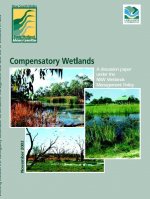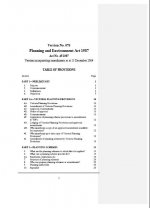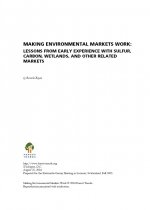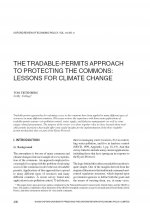Realising natures value
The Final Report of the Ecosystem Markets Task Force
Ecosystem Markets Task ForceThe Ecosystem Markets Task Force: introduction The Ecosystem Markets Task Force is a practical, business led review of the business opportunities that arise from valuing nature correctly. The work of the Task Force is a key commitment in the Governments Natural Environment White Paper, The Natural Choice. The White Papers ambition is to create a […]
Road Risks & Environmental Impact Assessments in Malaysian Road Infrastructure Projects
Dr Mohammed Alamgir, Dr Mason J. Campbell, Dr Sean Sloan , Dr Wong Ee Phin, Prof. William F. LauRoads can promote economic growth and social integration but they can also initiate environmental, economic and socio-political harms. In many cases, these harms can be considerably minimised and the road benefits maximised through proactive planning by road engineers and effective Environmental Impact Assessments (EIAs).
Livestocks long shadow: environmental issues and options
Food and Agriculture OrganizationA new report from FAO says livestock production is one of the major causes of the world’s most pressing environmental problems, including global warming, land degradation, air and water pollution, and loss of biodiversity. Using a methodology that considers the entire commodity chain, it estimates that livestock are responsible for 18 percent of greenhouse gas […]
Planning and Environment Act 1987: Version No 075
Government of Australia
Natura 2000 and Forests Challenges and Opportunities’
European UnionThis document aims to clarify the role of forests and forestry in the Natura 2000 ecological network, in order to facilitate the uptake of Natura 2000 among forestry operators.
Making Environmental Markets Work: Lessons from Early Experience with Sulphur , Carbon, Wetlands and Other Related Markets
Ricardo BayonEver since the passage of the 1990 amendments to the US Clean Air act and the creation of a market in sulfur dioxide (SO2), it has become clear that market mechanisms can be effectively used to achieve environmental policies. But markets are neither infallible nor automatic. They have blind spots and they need to be […]
The Tradable Permits Approach to Protecting the Commons: What Have We Learned?
Tom TietenbergThe atmosphere is but one of many commons and climate change is but one example of over-exploitation of the commons. An approach employed increasingly for coping with the problem of rationing access to the commons involves the use of tradable permits. Applications of this approach have spread to many different types of resources and many […]
Executive Summary of BBOP Standard, Technical Handbooks and Resource Papers
BBOPThis document provides a brief summary of the core documents developed by BBOP and an overview of how they relate to each other. Documents summarized include the BBOP Standard on Biodiversity Offsets, its accompanying Guidance Notes, and supporting materials such as the Handbooks on offset design, implementation and the cost benefit handbook, as well as […]
Forecasting the path towards a Net Positive Impact on biodiversity for Rio Tinto QMM
Helen Temple, Stuart Anstee, Jon Ekstrom, John D Pilgrim, J. Rabenantoandro, J-B. Ramanamanjato, F. Randriatafika , M. Vincelette - The Biodiversity Consultancy, Rio Tinto, The Biodiversity Consultancy, The Biodiversity ConsultancyRio Tinto is committed to achieving a Net Positive Impact (NPI) on biodiversity at sites where it operates, a strategy launched at the 2004 IUCN World Conservation Congress and reinforced at the 2008 Congress (Rio Tinto, 2008a). The Rio Tinto ilmenite mine in the Fort Dauphin region of southeastern Madagascar run by QIT Madagascar Minerals […]
Annual Report of the Native Vegetation Council, 2001/2002
Government of AustraliaThe Native Vegetation Act, 1991 (the Act) was proclaimed on 18 April 1991. The Act replaced the Native Vegetation Management Act, 1985, and controls the clearance of native vegetation as well as having a number of initiatives to assist the conservation, management and research of native vegetation on lands outside the National Parks and Wildlife […]










